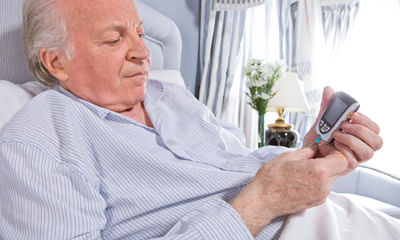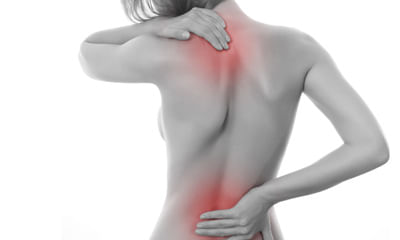Medicine For Hyperkalemic Periodic Paralysis
Sir my father is suffered from paralysis since 2003 after the recovery they become quite well but previous when we come ...
Ask Free Question
It might be due to hypoglycemia I.e. low blood sugar ..give him something sweet to eat immediately or honey ..and take him to hospital...his treatment requires change
Hi my Mom got paralysis stroke 1 month back. Her right hand and leg not working. She is under medication and taking phys ...
Ask Free Question
Hello, be regular with the current medication and Physiotherapy.Along with these take Homoeopathic medicine Causticum 200, 5 drops once in a week. Revert after 1 month.
My mother is a CVA patient since 2013 June & since then she can't perform day to day activities on her own. She has got ...
Ask Free Question
Do consult expert in neuro physiotherapist and continue good rehabilitation to her functional abilities
A person get brain hemorrhage and paralysis attack on the right side. Before 4 month. We are not satisfied with improv ...
Ask Free Question
Ofcourse yes sir. Homoeopathy will definitely make remarkable progress, when there is no progress by any medicine, homoeopathy do miracle. You can consult me for homoeopathic treatment without side effects.
My mother is 60 years old now. She had a very stressful life. In last 10 years, she had few major health issues. First j ...
Ask Free Question
She needs to be monitored by a physician and a psychologist. Moreover, to prescribe any medicines you have to ask privately and not in open forum questions.
I am female, 32 years old, I am from india, I had back pain right leg pain past 4 to 5 years. Still now I went to dr, bu ...
Ask Free Question
Hi you can find physiotherapist near by who is expert in mulligan therapy and mckenzie. As physiotherapy treatment is non surgical so it will not cost you much. Make daily routine of exercise. Best wishes.
My wife (78) had brain stroke on 26 - 10 2013. She was in hospital for ten days in icu and sixteen days in ward. She is ...
Ask Free Question
Hi Continue medication and physiotherapy as prescribed. Keep patience, you will see progress. Best wishes.
I have a hypokalemia paralysis with normal level of thyroid I continue my medicine from one month but still my poytasium ...
Ask Free Question
Hypokalemic periodic paralysis is a disorder that causes occasional episodes of muscle weakness and sometimes a lower than normal level of potassium in the blood. It is one of a group of genetic disorders that includes hyperkalemic periodic paralysis and thyrotoxic periodic paralysis. Causes hypokalemic periodic paralysis is congenital. This means it is present at birth. In most cases, it is passed down through families (inherited) as an autosomal dominant disorder. In other words only one parent needs to pass the gene related to this condition on to you in order for you to be affected. Occasionally, the condition may be the result of a genetic problem that is not inherited. Unlike other forms of periodic paralysis, persons with congenital hypokalemic periodic paralysis have normal thyroid function. But they have a very low blood level of potassium during episodes of weakness. This results from potassium moving from the blood into muscle cells in an abnormal way. Risk factors include having other family members with periodic paralysis. The risk is slightly higher in asian men who also have thyroid disorders. The most important treatment in severe hypokalemia is addressing the cause, such as improving the diet, treating diarrhea, or stopping an offending medication. Patients without a significant source of potassium loss and who show no symptoms of hypokalemia may not require treatment. Mild hypokalemia (>3.0 meq/l) may be treated with oral potassium chloride supplements (klor-con, sando-k, slow-k). As this is often part of a poor nutritional intake, potassium-containing foods may be recommended, such as leafy green vegetables, tomatoes, coconut water, citrus fruits, oranges, or bananas.[14] both dietary and pharmaceutical supplements are used for people taking diuretic medications. Severe hypokalemia (<3.0 meq/l) may require intravenous supplementation. Typically, a saline solution is used, with 20? 40 meq/l kcl per liter over 3? 4 hours. Giving iv potassium at faster rates (20? 25 meq/hr) may predispose to ventricular tachycardias and requires intensive monitoring. A generally safe rate is 10 meq/hr. Even in severe hypokalemia, oral supplementation is preferred given its safety profile. Sustained-release formulations should be avoided in acute settings. Difficult or resistant cases of hypokalemia may be amenable to a potassium-sparing diuretic, such as amiloride, triamterene, spironolactone, or eplerenone. Concomitant hypomagnesemia will inhibit potassium replacement, as magnesium is a cofactor for potassium uptake. when replacing potassium intravenously, infusion by a central line is encouraged to avoid the frequent occurrence of a burning sensation at the site of a peripheral infusion, or the rare occurrence of damage to the vein. When peripheral infusions are necessary, the burning can be reduced by diluting the potassium in larger amounts of fluid, or mixing 3 ml of 1% lidocaine to each 10 meq of kcl per 50 ml of fluid. For more doubts you can ask me privately.
She has also gone through paralysis attack twice. But there is no relief In back pain. Please advise. ...
Ask Free Question
Kindly show me a photograph & digital X RAYS of affected part. Rule out diabetes & vit.D deficiency or any other metabolic disorder. Sleep on a hard bed with soft bedding on it. SPRING BEDS, FOLDING BEDS OR THICK MATRESS ARE HARMFUL Use no pillow under the head. DO HOT FOMANTATION. Paracetamol 250mg OD & SOS x 5days. Caldikind plus 1tab OD x10. Do neck, back & general exercises. It may have to be further investigated. You will need other supportive medicines also. Make sure you are not allergic to any of the medicines you are going to take. Do reply back for detailed treatment plan. Do not ignore .It could be beginning of a serious problem.





